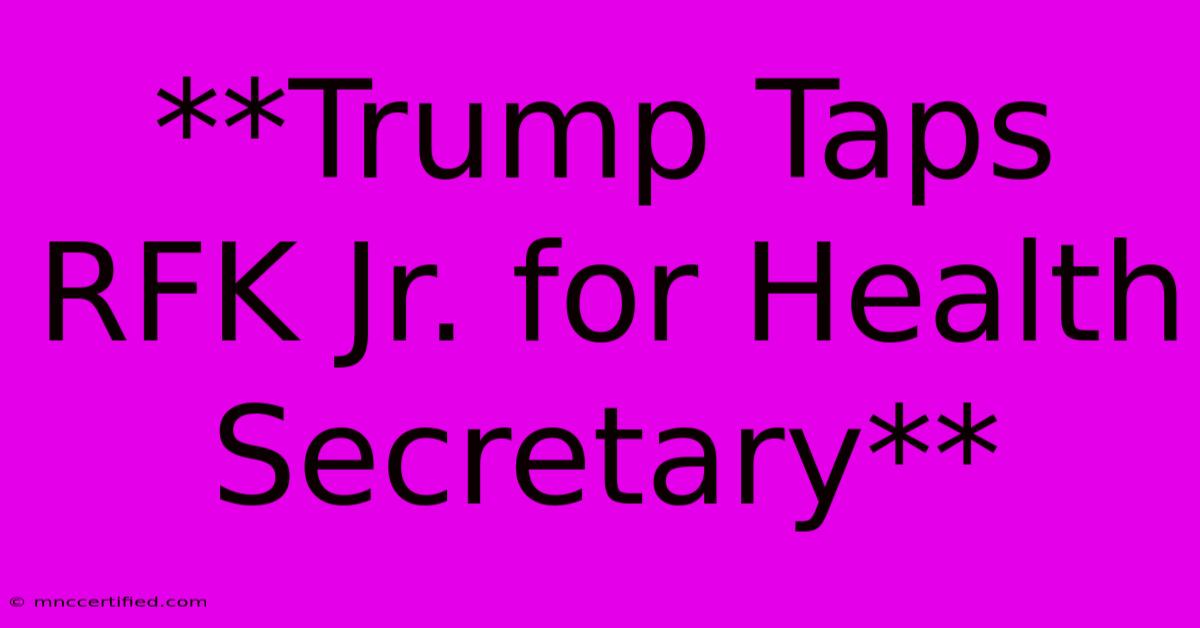**Trump Taps RFK Jr. For Health Secretary**

Table of Contents
Trump Taps RFK Jr. for Health Secretary: A Controversial Choice with Far-Reaching Implications
Robert F. Kennedy Jr.'s potential appointment as Secretary of Health and Human Services under a second Trump administration has sent shockwaves through the political landscape. This controversial choice sparks intense debate, raising questions about policy shifts, public health, and the future direction of healthcare in the United States. This article delves into the implications of this potential appointment, examining the arguments for and against, and exploring its potential impact on various facets of American life.
RFK Jr.'s Anti-Vaccine Stance: A Major Point of Contention
Kennedy's outspoken views on vaccines are arguably his most contentious position. He has long been a vocal critic of mandatory vaccination programs, associating them with autism and other adverse health effects—claims widely refuted by the scientific community. The Centers for Disease Control and Prevention (CDC) and the World Health Organization (WHO) have consistently confirmed the safety and efficacy of vaccines in preventing numerous infectious diseases. His stance directly contradicts the established scientific consensus and raises serious concerns about public health policy under a potential Trump administration.
The Potential Impact on Vaccination Rates
A Kennedy-led HHS could potentially lead to a significant decrease in vaccination rates. This could have devastating consequences, resulting in outbreaks of preventable diseases like measles, polio, and whooping cough. The consequences extend beyond individual health, potentially impacting public health infrastructure and straining healthcare resources.
Beyond Vaccines: Other Controversial Positions
Kennedy's views extend beyond vaccines, encompassing a range of health-related issues. His stances on environmental toxins, pharmaceutical industry practices, and healthcare access represent a significant departure from mainstream medical and political consensus. These views, while resonating with certain segments of the population, raise concerns among those who prioritize evidence-based policymaking.
Potential Policy Shifts under Kennedy's Leadership
A Kennedy-led HHS could usher in dramatic shifts in health policy. This might include reduced funding for vaccine programs, altered approaches to disease prevention, and potentially weakened regulatory oversight of pharmaceutical companies. These potential changes could fundamentally reshape the American healthcare landscape.
Arguments in Favor of Kennedy's Appointment
While criticism is widespread, some argue that Kennedy's appointment could offer benefits. Supporters highlight his focus on environmental health and his advocacy for addressing the impact of toxins on human health. They believe his perspective could bring much-needed scrutiny to the pharmaceutical industry and lead to reforms within the healthcare system.
The Importance of Diverse Perspectives in Healthcare
Some proponents suggest that incorporating diverse viewpoints, even controversial ones, is crucial for developing comprehensive health policies. They argue that Kennedy's unique perspective could stimulate critical conversations and lead to innovative solutions within the healthcare sector.
The Political Landscape and Public Opinion
The potential appointment of RFK Jr. is deeply intertwined with the broader political landscape. It reflects the ongoing polarization of American society and the increasing influence of populist and anti-establishment movements. Understanding public opinion on this appointment requires analyzing the interplay of political affiliation, trust in institutions, and beliefs about public health.
The Role of Media Coverage and Public Discourse
The media's role in shaping public discourse surrounding this potential appointment is paramount. Responsible journalism is crucial for informing the public and facilitating a nuanced understanding of the complex issues at play. Accurate reporting, free from bias, is vital for ensuring a well-informed public debate.
Conclusion: A Defining Moment for American Healthcare
The potential appointment of Robert F. Kennedy Jr. as Health Secretary represents a pivotal moment for American healthcare. His controversial stances, particularly concerning vaccines, present significant challenges and potential risks to public health. While his supporters emphasize the importance of diverse perspectives, the potential negative consequences of his appointment necessitate a careful and thorough examination of his views and their potential impact on the nation's health and well-being. The coming weeks and months will undoubtedly bring further discussion and debate as this controversial choice unfolds. It's crucial to rely on reputable sources and engage in informed discussion to understand the full ramifications of this significant development.

Thank you for visiting our website wich cover about **Trump Taps RFK Jr. For Health Secretary**. We hope the information provided has been useful to you. Feel free to contact us if you have any questions or need further assistance. See you next time and dont miss to bookmark.
Featured Posts
-
Watch Venezuela Vs Brazil World Cup Live Online
Nov 15, 2024
-
Fifa Wc 2026 Paraguay Vs Argentina Highlights
Nov 15, 2024
-
Jalen Hurts Injury Concussion Update For Eagles
Nov 15, 2024
-
Usa Vs Jamaica Match Preview And Lineup Updates
Nov 15, 2024
-
2024 Latin Grammys Karol G Edgar Among Winners
Nov 15, 2024